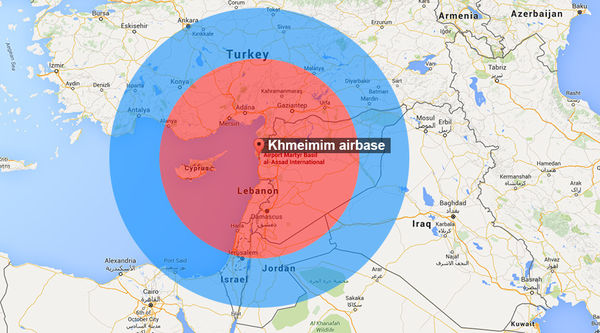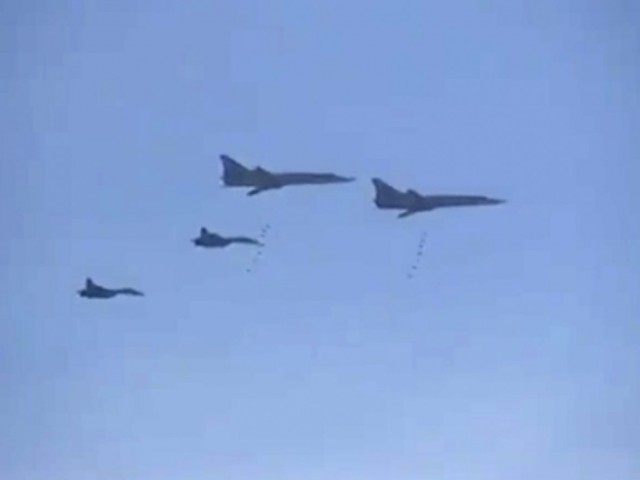This morning’s key headlines from GenerationalDynamics.com
- Russia’s military buildup makes Syria into a Russian no-fly zone
- Russia ends food imports from many countries
- Turkey’s Erdogan ‘saddened’ by downing of Russia’s warplane
Russia’s military buildup makes Syria into a Russian no-fly zone

The S-400 missile can reach 400 km, and as high as 27 km. The radar has a range of 600 km. (RT)
Russia’s deployment of its advanced S-400 air defense missile systems at Syria’s Khmeimim airbase one day after Turkey shot down a Russian warplane has effectively implemented a no-fly zone under Russian over most of Syria, as well as Lebanon, Cyprus, half of Israel, western regions of Iraq and Saudi Arabia, and a vast part of Turkey.
According to Russia’s Ministry of Defense:
In accordance with the decision of the Supreme Commander of the Russian Armed Forces, today an S-400 air defense missile system has been promptly delivered, deployed and already began combat duty to provide cover for the area around the Russian Hmeymim air base in Syria.
This is certainly a “game-changer,” as it makes many flights by American, Israeli and Turkish planes almost impossible without permission from Russia. In fact, Russian media are bragging that the U.S. and Turkey immediately stopped airstrikes since the S-400 systems were deployed, and Turkey is avoiding all flights near the Syrian border.
There is also an electronic jamming war going on between Russia and Turkey. The Russians put into place anew electronic warfare multifunctional systems to disrupt Turkish flights and forces. Turkey has countered by installing the KORAL electronic jamming system along its southern border with Syria.
This vast Russian military buildup in Syria has significant consequences for Turkey. Turkey and Syria have centuries of bitter warfare behind them, and now Russia is hemming Turkey in from the south in Syria and from the north in occupied Crimea. ( “25-Nov-15 World View — Turkey shoots down Russian warplane, evoking memories of many Crimean wars”)
It is also significant for Israel which has, on occasion, conducted airstrikes into Syria to prevent convoys of weapons from being delivered to Hezbollah in Lebanon. Such weapons convoys will now be under Russian protection, and Hezbollah will get all the weapons it wants.
It is worthwhile reminding readers at this point that, as I have been writing for years, Generational Dynamics predicts that Russia and Iran will trend towards becoming our allies, while Saudi Arabia, Turkey and the Sunni Muslim countries will trend towards becoming our enemies. (See for example “9-Nov-15 World View — Political crisis in Iran grows over nuclear agreement”) Those predictions seemed fantastical ten years ago, but now we see them coming true, step by step, week after week, much to many people’s astonishment, including mine. Russia Today and Debka and Russia Today
Russia ends food imports from many countries
In 2006, Russia wanted to retaliate against Georgia’s increasingly pro-Western stance and ambitions to join Nato. So in March 2006, Russia banned wine imports from Georgia. In 2005, Georgia had exported wine worth a total of $18.4 million, but by 2007 that figure had fallen 64% to just $29.2 million.
After Russia’s invasion of Ukraine and annexation of Crimea, the West imposed financial sanctions on Russia. Russia retaliated in August 2014 by banning most food imports from the EU, as well as from Australia, Canada, Norway and the US in August last year. Three months ago, the ban was extended to Iceland, Liechtenstein, Albania and Montenegro.
Ukraine has announced plans to implement a free trade agreement with the European Union, beginning in January 2016. Russia retaliated by announcing that food imports from Ukraine would be banned, also starting in January 2016.
Now Russia is banning food and agricultural products from Turkey, in retaliation for the downing last week of the Russian warplane.
One might wonder if Russia is running out of countries to import food from. Well, with over 200 countries in the world, that’s not likely to happen soon. In fact, Russia’s agricultural minister has pointed out that Russia could import fruit and vegetables from Iran, Israel, Morocco, Azerbaijan, China, South Africa and Argentina.
Other Russian sanctions target Turkish businesses in Russia, and Russian tourists who wish to visit Turkey.
Russia’s sanctions may benefit the United States. The sanctions will also terminate millions of tons of Russia’s wheat exports to Turkey. Russia is the largest wheat exporter to Turkey. U.S. and European agricultural dealers have millions of tons of wheat in storage, and could immediately sell that to Turkey.
However, there is a broader point to be made. I frequently have someone tell me that “those two countries won’t go to war because it’s bad for business.” The assumption is that if two countries trade a lot with each other, then they won’t do anything to disturb that trade.
I have frequently heard this argument with regard to China and Taiwan. “China won’t invade Taiwan,” I am told, “because it’s bad for business.” And yet, Britain declared war on Nazi Germany, even though it was bad for business. In fact, if war were prevented because it was bad for business, then there would almost never be any wars.
But now we see that just the opposite is true. If two countries have strong trade relations, then trade simply becomes another weapon of war, in the form of sanctions. Whether sanctions ever actually accomplish anything useful is highly questionable, but trade does not prevent war. BBC and Sputnik News (Moscow)
Turkey’s Erdogan ‘saddened’ by downing of Russia’s warplane
Turkey’s president Recep Tayyip Erdogan did not apologize for the downing of Russia’s warplane last week, but seemed to come close, when he said that he was “saddened”:
I’m really saddened by the incident. We wish it had never happened, but it happened. I hope something like this doesn’t happen again.
We hope that the issue between us and Russia does not escalate any further, become corrosive and have dire consequences in the future. […]
What we tell Russia is ‘Let’s resolve this issue between ourselves and within its boundaries. Let’s not make others happy by destroying our whole relationship. I think the U.N. Global Climate Change Summit to be held in Paris on Monday could be an opportunity to restore our relations. […]
Russia is important for Turkey as much as Turkey is important for Russia. Both countries cannot afford to give up on each other.
Actually, this statement sounds a bit desperate to my ear.
At any rate, Russia’s president Vladimir Putin has demanded a full apology, and says that he will not speak to Erdogan until Erdogan apologizes. So it seems unlikely that they will meet in Paris on Monday. Hurriyet (Ankara) and Al Manar (Lebanon)
KEYS: Generational Dynamics, Russia, Turkey, Syria, Khmeimim airbase, S-400, Georgia, Ukraine, Crimea, China, Taiwan, Britain, Nazi Germany, Recep Tayyip Erdogan, Vladimir Putin
Permanent web link to this article
Receive daily World View columns by e-mail

COMMENTS
Please let us know if you're having issues with commenting.